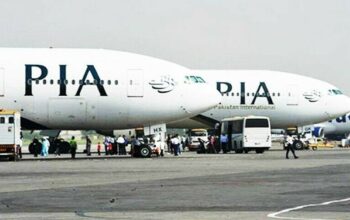Dr Khaqan Najeeb makes a case for serious measures to temper the coming flood of inflation.
By Staff Reporter
ISLAMABAD: Historic high inflationary pressures threaten to hold Pakistan’s economy hostage in the new fiscal year in the wake of consumer inflation reaching 21.34 percent for June, the last month of the previous fiscal.
What is more, experts say Consumer Price Index (CPI) data should be taken with a pinch of salt because there are some obvious anomalies in the price data of wheat flour in Punjab and Khyber Pakhtunkhwa provinces.
The key driver of inflation in the coming months will be the historic high Wholesale Price Index (WPI), quoted at 38.9 percent for June 2022, the highest level in the country’s history. Consumer inflation can only go up when prices translate from wholesale to retail stage after a time lag of one or two months period.
What is more, the revised budget documents for 2022-23 show that the government has increased the petroleum levy target for the current fiscal year from PKR 750 billion to PKR 855 billion. With inflation already at such high levels, there seems no justification to further hike the petroleum levy – but the authorities seem intent on eventually increasing it to PKR 50 per litre.
The authorities have already imposed a PKR 10 per litre levy on petrol and PKR 5 per litre on diesel and other POL products with effect from July 1, 2022. At this rate, the economic managers hope to collect PKR 15 billion a month.
Experts believe that the import induced inflation will go up further on short to medium term basis unless the authorities focus on improving productivity and efficiency in the neglected agriculture sector.
In sum, the stage is set for CPI based inflation to soar as high as 23 or 24 percent for June 2022 – unless something happens to temper it (or someone starts fiddling with pricing data).
Pakistan Bureau of Statistics (PBS) is responsible for gathering pricing data and crunching inflation numbers. There are some apparent anomalies in data collection, which have been highlighted by observers time and again but officials have not bothered to respond.
For instance, average wheat flour price has been quoted at just over PKR 1200 per 20 kg bag. Official data shows that the minimum price of a 20 kg wheat flour bag hovers around PKR 980 in Peshawar.
However, in the vicinity of the same city, the maximum price is shown touching over PKR 1600 per bag. This huge variation of price within the city of Peshawar warrants an investigation.
Also, price of a 10 kg wheat flour bag in Gujranwala has been quoted at PKR 700, higher than PKR 682/10 kg in Bannu and Hyderabad. On the other hand, it seems unrealistic in view of the fact that the price of a 20 kg wheat flour bag is PKR 980 in the whole of Punjab. The only explanation can be an issue with the price data.
In Karachi, the price of a 20 kg wheat flour bag ranges from PKR 1,500 to PKR 1700. There is a differential of PKR 600 to PKR 720 per bag in Karachi and Gujranwala.
Former advisor to the Ministry of Finance Dr Khaqan Najeeb finds June 22 data for inflation implausible on the upside especially SPI of 32 percent and WPI of 39 percent.
Managing inflation beyond monetary tightening is a key challenge for the government to give relief to the people, he told Independent Pakistan, and said vigilant supply-side monitoring of key food items was important to manage food inflation in the short run.
“The government must also ensure supply of cheaper fuels, ensure that there is no undervaluation of the rupee, and limit the rate of monetary expansion”, he said.
He felt serious work is required to upgrade the productive capacity of Pakistan’s industry and agriculture sector if the country has to get a grip on inflation in the medium term. Real hard work is required for import substitution in food items, replacement of imported coal with Thar coal by upgrading existing power plants, and substitution of gasified coal for gas.
Dr Najeeb sees a serious need to move the power sector to a competitive market model, but he wans the government’s intervention must be limited to improving the functioning of markets.
“We must realize that SOEs are a drag on the economy and partly cause the high tariff due to their inefficiencies resulting in high inflation”, he told Independent Pakistan. “But privatization or restructuring both have been slow and ineffective.”
He said the country is locked in an inflation spiral unless some serious measures are taken to pull the economy out of it, he said, adding the hope for such serious measures remained limited at best.
Copyright © 2021 Independent Pakistan | All rights reserved




